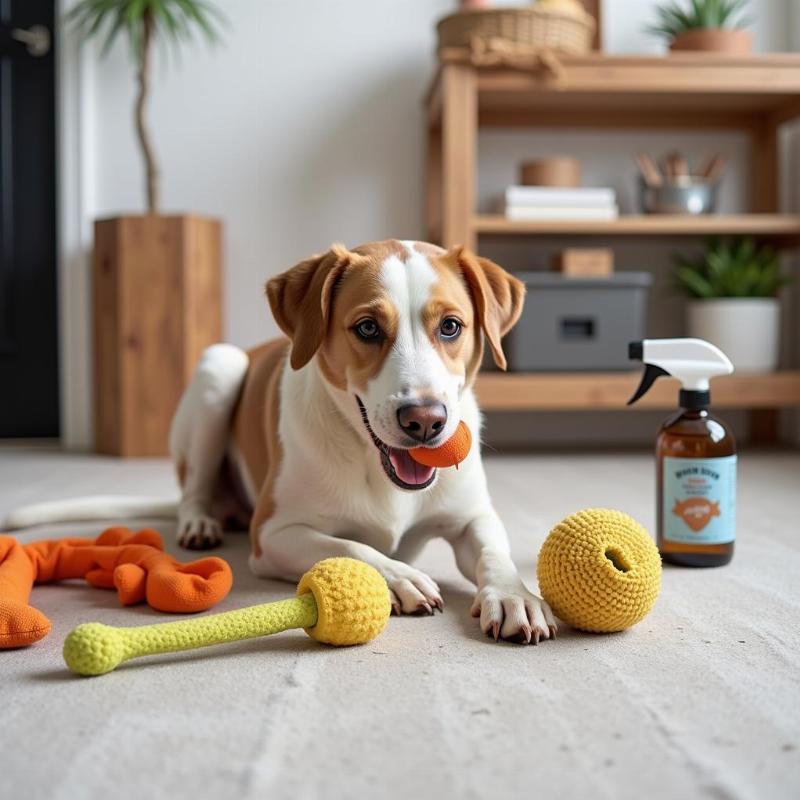Spray deterrents can be a helpful tool in preventing destructive chewing in dogs, especially when combined with training and environmental management. Understanding how these deterrents work, choosing the right one, and using it effectively is key to success. This article will guide you through everything you need to know about using spray deterrents for dogs chewing in the US, ensuring the safety and well-being of your furry friend while preserving your furniture and belongings.
Choosing the Right Spray Deterrent
The US market offers a variety of spray deterrents formulated to discourage dogs from chewing. Look for products specifically designed for dogs, as these are formulated with their safety in mind. Avoid using general-purpose bitter sprays intended for humans, as these can contain ingredients harmful to pets. Check the label for ingredients and avoid those with harmful chemicals or known allergens. Many pet owners prefer natural, plant-based deterrents like bitter apple or citrus sprays, which are generally safe and effective. Consider your dog’s sensitivity and any potential allergies when selecting a spray.
Applying the Spray Deterrent Effectively
Before applying the spray, test it on a small, inconspicuous area of the item you want to protect to ensure it doesn’t stain or damage the material. Once you’re sure it’s safe, apply the spray liberally to all surfaces your dog tends to chew on. Reapply the spray regularly, especially after cleaning or if the scent fades. Consistency is key to reinforcing the negative association with chewing on sprayed objects.
Training and Environmental Management
While spray deterrents can be effective, they are most successful when used as part of a comprehensive approach. Provide your dog with plenty of appropriate chew toys to satisfy their natural chewing instincts. Rotate these toys regularly to keep them interesting and engaging.
 Training and Environmental Management
Training and Environmental Management
Addressing the Underlying Cause of Chewing
Chewing can stem from various reasons, including teething, boredom, anxiety, or even medical conditions. If your dog’s chewing persists despite using deterrents and other strategies, consult with a veterinarian or a certified dog trainer. They can help determine the underlying cause of the chewing and recommend appropriate solutions. Early intervention is crucial for addressing any potential behavioral or medical issues.
Homemade Anti-Chew Sprays
Some pet owners prefer making their own deterrents. While this can be a cost-effective option, it’s crucial to ensure the ingredients are safe for dogs. Common homemade solutions include diluted vinegar or citrus sprays. However, always research thoroughly before using any homemade recipe, and consult with your veterinarian if you have any concerns.
Conclusion
Spray deterrents can be a valuable tool in preventing destructive chewing in dogs when used correctly and as part of a holistic approach. Remember to choose a safe and effective product, apply it consistently, and combine it with training and environmental management. By understanding your dog’s chewing behavior and addressing its root cause, you can create a harmonious environment for both you and your furry friend. Don’t forget to consult a veterinarian or professional dog trainer if you’re struggling to manage your dog’s chewing.
FAQ
- Are spray deterrents safe for my dog? Most commercially available dog chew deterrents are safe when used as directed. Always check the label for ingredients and avoid those with harmful chemicals.
- How often should I reapply the spray? Reapply the spray regularly, especially after cleaning or when the scent fades.
- What if the spray doesn’t work? If the spray is ineffective, consider other training methods, environmental management techniques, or consult a veterinarian to rule out any underlying medical conditions.
- Can I make my own dog chew deterrent spray? Yes, you can make homemade sprays using ingredients like diluted vinegar or citrus. Always research thoroughly to ensure ingredient safety.
- What other strategies can I use to prevent chewing? Provide plenty of appropriate chew toys, ensure adequate exercise and mental stimulation, and address any underlying anxiety or boredom.
- When should I contact a veterinarian? If the chewing is excessive, sudden, or accompanied by other symptoms, consult a veterinarian.
- How do I choose the best chew deterrent for my dog? Consider your dog’s age, breed, chewing habits, and any potential allergies when selecting a spray.
Related Articles
- what to put on furniture to keep dogs from chewing
- spray to stop dogs chewing
- how to stop dog from chewing cords
- spray to prevent dog chewing
Beautdogs.us is your premier resource for all things dog-related in the US. We offer expert advice on dog breeds, care, and products, catering to both new and experienced dog owners. From choosing the right spray deterrent for dogs chewing to understanding the nuances of different breeds, Beautdogs.us provides comprehensive and reliable information to help you navigate the joys and challenges of dog ownership. Contact us today for expert advice! Email: [email protected], Phone: +1 501-555-7529.